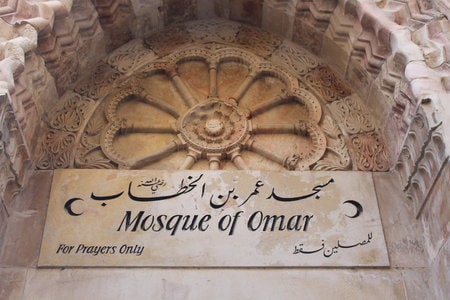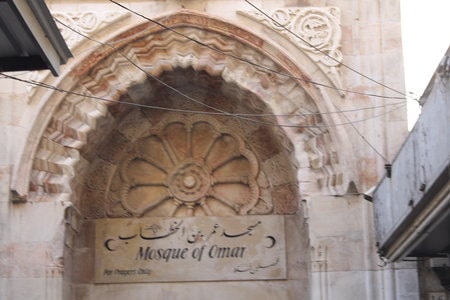Mosque of Omar
The Mosque of Omar in Jerusalem
Just opposite the entrance to the Church of the Holy Sepulcher, in the Christian Quarter of the Old City in Jerusalem, stands the majestic Mosque of Omar. Identifiable by its minaret which rises next to the two domes of the Church of the Holy Sepulcher.
This building dating from the 12th century amazes us thanks to its architecture and its good state of conservation, as well as to its high spiritual value. Built in the South of the Christ’s grave, its geographical location reflects the very special coexistence of different religious denominations in the holy city of Jerusalem.
Mosque of Omar: A living symbol of tolerance
For the record, the Mosque of Omar was built in 1193 by Al-Afdhal Nurad-Din Ali, Saladin's son, where Caliph Omar had prayed when he came to Jerusalem in 638. Having peacefully conquered the city, the latter preferred to pray in the courtyard of the Church of the Holy Sepulcher rather than inside the Christian holy place. He wanted to prevent it from being transformed, in the future, into a mosque by his descendants and worshippers.
This was the case since the Holy Sepulcher served, at no time in its history, as a place of worship for the Muslims, despite the many invasions in the city. A living symbol of the peaceful coexistence between Islamism and Christianity, the Mosque of Omar houses a copy of the Omar Pact with the inhabitants of Jerusalem. Stuck on a facade of the building, this pact guarantees the safety of residents of other religious denominations and their places of worship. It avoided all bloodshed in the holy city.
Site visit
Resistant to time, the Mosque of Omar has a captivating architecture, with its stones and the small arch located at its front door. The visit of the interior of the mosque is unfortunately prohibited to tourists. However, it is possible to go to the courtyard to admire the beautiful façade of the building and the copy of the Omar Pact, engraved in the marble.
To be seen nearby
Leaving the Mosque of Omar, you can continue your journey in the Holy Land with a memorable visit to the Church of the Holy Sepulcher which, as mentioned above, is attached to the mosque. The Via Dolorosa which symbolizes the journey of Christ until his crucifixion may also be part of your visit to experience all the emotion of this major episode of the Christian faith.
The Christian quarter of the Old City in Jerusalem has typical Arabic markets where you can find some unique souvenirs.


